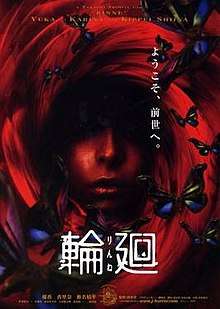Reincarnation (film)
Reincarnation (輪廻, Rinne) is a 2005 Japanese horror film, directed by Takashi Shimizu. It centers on a hopeful actress who won a role in a film that takes her, the cast, and the crew to a hotel where the present soon collides with the past.
| Reincarnation | |
|---|---|
 Theatrical release poster | |
| Directed by | Takashi Shimizu |
| Produced by | Takashige Ichise[1] |
| Screenplay by |
|
| Starring | |
| Music by | Kenji Kawai[1] |
| Cinematography | Takahide Shibanushi[1] |
| Edited by | Noboyuki Takahashi[1] |
Production company |
|
| Distributed by | Toho |
Release date |
|
Running time | 95 minutes[1] |
| Country | Japan |
| Box office | $4,274,679[2] |
It was released as a part of the six-volume J-Horror Theater.
Plot
A number of people see visions of apparently dead people: a businessman finds one behind him in an elevator and a truck driver runs over one on the road.
Professor Norihasa Omori visits a local hotel and films himself killing eleven of the hotel guests, employees, and his own children before committing suicide, all as part of his wish to understand reincarnation. The footage of the murders disappears. Thirty-five years later, horror movie director Ikuo Matsumura decides to make a film about the massacre. As the date of the shoot draws near, Nagisa Sugiura (Yūka), the actress set to star as Omori's daughter Chisato, is haunted by the ghosts of the victims. She begins hallucinating and is plagued by nightmares of the killings. She discovers an old film camera which is the same type the professor had used.
Yayoi Kinoshita (Karina Nose), a college student, meets Yuka Morita (Marika Matsumoto), an actress who had auditioned for Ikuo's movie. Yuka says she remembers things in a "past life" and shows Yayoi a birthmark that looks like evidence of strangulation. Ghosts later drag Yuka away. Yayoi's research takes her to the only survivor of the attack: Ayumi Omori, the professor's wife. She explains that he had become obsessed with the idea that the body is just a vessel.
During filming, Nagisa starts hallucinating. Nagisa's agent reviews the camera, which consists of the film the professor took as he committed the murders. As this film plays, Nagisa reenacts the events in her hallucination. She witnesses the actors, including Yayoi and the director, and the two men in the start of the movie, all transform into the people they portray. With the victims walking toward her, she escapes and runs into the town. Simultaneously, her agent watches the film of this escape from the professor's POV. Nagisa finds herself cornered in a store and grabs a piece of glass to kill herself. She looks at her reflection and sees the face of the professor. Her agent watches the professor in his film reveal Nagisa's reflection instead of his own in the glass, before he cuts his own throat. Nagisa starts to reenact the professor's suicide but the doll stops her to tell her they will be together forever.
A group of executives watch Nagisa's take. Among them is the professor's wife. Near the end, Nagisa collapses, shaking and screaming as crew members come to her aid. By the professor's wife are her two children and the wife smiles. Sometime later, in a mental ward, Nagisa is bound in a full-body wrap and still haunted by the souls of Omori's children. The professor's wife looks at her through the door window, then passes her children's favourite toys through to Nagisa: a red ball and the doll. Nagisa screams but eventually calms down with a sinister smile as the ghosts of the children close in on her.
Cast
- Yūka as Nagisa Sugiura
- Karina Nose as Yayoi Kinoshita
- Kippei Shiina as Ikuo Matsumura
- Tetta Sugimoto as Tadashi Murakawa
- Marika Matsumoto as Yuka Morita
- Shun Oguri as Kazuya Onishi
- Mantaro Koichi as Producer Yamanaka
- Atsushi Haruta as Norihasa Omori
- Miki Sanjo as Ayumi Omori
- Younger version portrayed by Tomoko Mochizuki
- Mao Sasaki as Chisato Omori
- Hiroto Ito as Yuya Omori
- Takako Fuji as Takako Sudo (Hotel Maid)
- Shinji Nomura as Naoto Takada (Hotel Owner)
- Yuki Shiomi as Yuta Inomata (Receptionist)
- Izumi Kyoko as Kaoru Shintani (Hotel Maid 2)
- Yasutoki Furuya as Atsushi Ozawa (Waiter, Chef)
- Harada as M. Okuno (Guest)
- Yoshiko Nishi as Nao Okuno (Guest)
- Hiroshi Ishimaru as Taichi Hayami (Guest)
- Kayoko Toda as Yoko Takeuchi (Guest)
Release
The film was released as part of producer Takashige Ichise's J-Horror Theater series along with Infection, Premonition, and Retribution, among others.[3]
Reincarnation premiered at the 18th Tokyo International Film Festival in October 2005.[4] Reincarnation was distributed theatrically by Toho on January 7, 2006.[1] The film was released by Lions Gte Films on November 18, 2006 in the United States.[1]
It was theatrically released in the United States as one of the eight films in the nationwide film festival After Dark Horrorfest, which ran November 17 through 21, 2006.[5]
See also
Notes
- Galbraith IV 2008, p. 440.
- "Reincarnation". Boxofficemojo. Retrieved March 04, 2012.
- Logboy (August 18, 2006). "Reminder : 'Reincarnation' Uncut R2 UK DVD August 21st 2006". Twitch Film.
- "18th Tokyo International Film Festival Archive". Tokyo Film Festival. Archived from the original on June 9, 2008. Retrieved March 20, 2019.
- "8 Films To Die For - After Dark Horrorfest". After Dark. 2006. Retrieved December 14, 2006.
References
- Galbraith IV, Stuart (2008). The Toho Studios Story: A History and Complete Filmography. Scarecrow Press. ISBN 1461673747.CS1 maint: ref=harv (link)